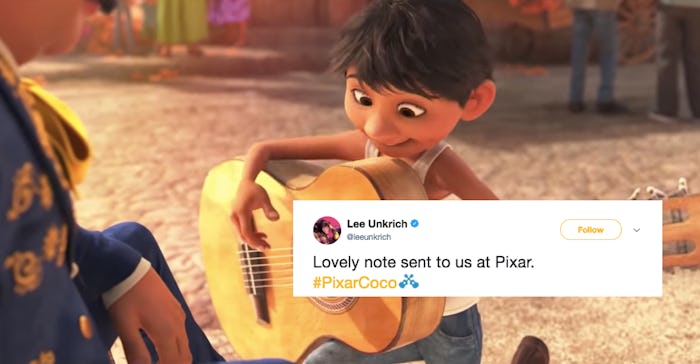Entertainment
This Letter Pixar Received About ‘Coco’ Will Seriously Bring Tears To Your Eyes
Disney Pixar's Coco has already proven itself to be a big hit, earning both rave reviews and box office dollars. But aside from just being an entertaining family movie, Coco's success is also sending out an important message about diversity on-screen. The film, which celebrates Mexico's Día de los Muertos tradition, is Pixar's first film to feature non-white characters in lead roles, and has an all-Latinx cast, who speak in both Spanish and English during the film. And the impact has been significant: this letter about Coco and the importance of representation is a heartwarming reminder that inclusion matters.
It's a pretty big deal that Pixar made a film like Coco, which offers up a beautiful story about Mexican culture that isn't based on stereotypes or which just ends up feeling like 90 solid minutes of cultural appropriation. That's because everyone benefits when art and popular culture aren't automatically filtered through a white-person lens, and when non-white children can grow up actually seeing characters in TV and movies that look and talk and live like they do. If you've never experienced feeling like an outsider because of your skin color or ethnicity, that may not always be obvious, but on Thursday, Coco director Lee Unkrich shared an email from a Mexican-American fan that perfect explained what the impact of representation really looks like.
In the email, the writer explains that she had grown up watching Pixar movies, and that they hold a special place in her heart. But unlike the other films, Coco was special to her for reasons that had nothing to do with childhood nostalgia.
As much as it matters that the characters and the story depicted Mexican culture, the writer of the note explained that it was just as important — if not more — that the film wasn't just being played in English, but that it was also available in theaters throughout the country with either Spanish dubbing or Spanish subtitles.
That might not seem like a big deal to fluent English speakers, but the writer of the email shared that her parents' English isn't that strong, and as kids, she and her sisters found it was a struggle to try and watch a movie together as a family. These days, of course, it's easy to just add Spanish subtitles to movies, or find versions with Spanish dubbing online or on DVD, but if you want to see a movie in the actual theater? You're still basically stuck watching it in English.
The decision to make Coco available in both Spanish and English meant that the writer of the note was able to take her mother to see the film with her — marking the first time in 30 years that she had actually been to a movie theater. What's more is that it was the first time ever that the two were able to go see a movie together, and there was absolutely no translation required.
For many of us, Coco is just a fun movie we might take our kids to see. But for immigrants who might struggle with the language (and presumably even those who don't), it breaks down a huge barrier, and one that often leaves them feeling as though they don't quite belong in their adopted country. As the writer of the note explained,
We went to the movies like real Americans do! My mother had tears in her eyes ... She has always felt a bit out of place in the [United States]. But last night, she forgot she was not from here. She felt at home.
Leaving your home country to try and provide a better life for yourself and your family can't be even remotely easy, and when it involves learning an entirely new language, it's even more difficult. And for Mexican immigrants specifically, the current political climate seems like it would only heighten any already-existing feelings of not being welcome.
Going to see a movie in a theater might not seem like something that would feel particularly meaningful, but in this case, it made a huge impact. And it's a reminder that, while some may dismiss the call for greater diversity on-screen as being a reflection of the so-called "political correctness" that became so maligned during the election, the truth is that it's really about letting often-marginalized Americans feel as though they belong. And as much as Coco clearly made a difference, hopefully it will just be the beginning.
Check out Romper's new video series, Romper's Doula Diaries:
Watch full episodes of Romper's Doula Diaries on Facebook Watch.
